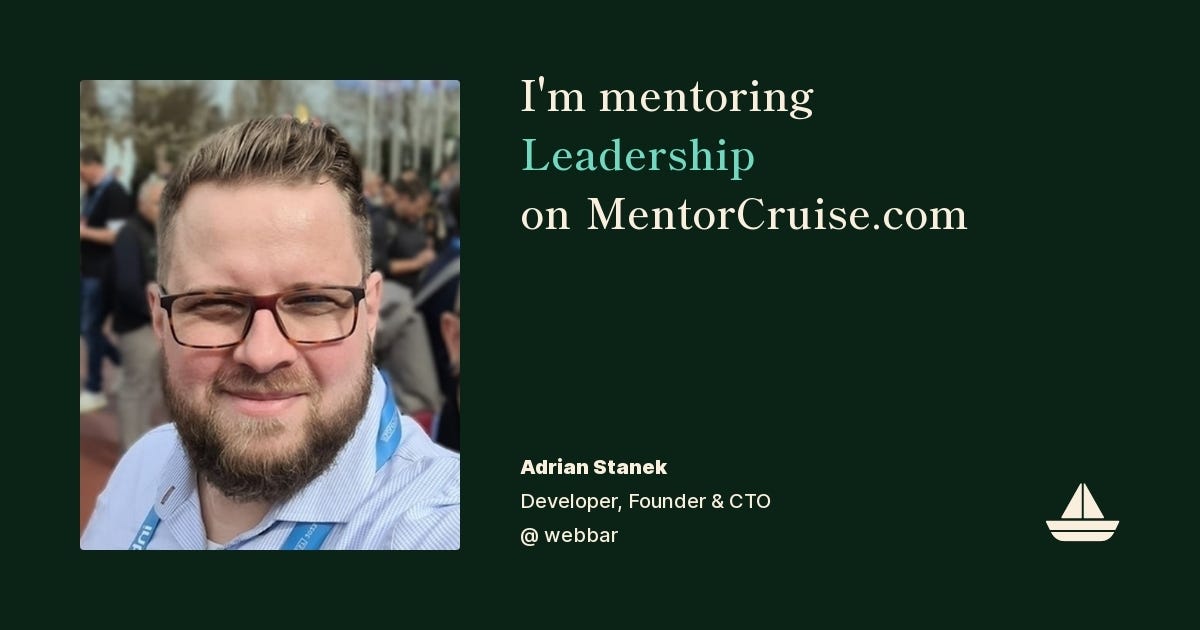If you want 2026 to change, end 2025 differently
I bet 2026 won’t change, right?
Be honest for a second: are you already lying to yourself about 2026 again?
Telling yourself the same old story, making big promises you’ll “definitely” change next year, because this year is “basically over” anyway?
❌ It’s not. There are 6 weeks left, not 6 days.
Most tech leaders I work with are secretly relieved that the year is almost over. The roadmap slipped, half the “non-negotiables” were in fact very negotiable, and a few people on the team still drain more energy than they create. So we tell ourselves a familiar story: next year will be different.
Next year I’ll really lead, not just react. Next year, we’ll finally fix delivery, expectations, and ownership. January becomes this magical reset button that will clean up what we weren’t willing to face in October and November.
What really happens – How you fool yourself, again.
You know how this actually plays out. December dissolves into “let’s just ship the critical stuff”; January is a blur of planning, people slowly coming back from holidays, and a collective amnesia about everything that hurt.
What was supposed to be a fresh start becomes a forget retreat. The org slides back into the same behaviour patterns as last year; same meetings, same dynamics, same avoidance.
👉 Homeostasis kicks in; humans and systems both return to their baseline.
The uncomfortable truth: if your baseline as a leader does not change in November and December, nothing meaningful will change in 2026. You can paste new OKRs on top of an old identity, but your nervous system, your habits, and your team culture will quietly drag you back to what feels familiar. That is why all those “this time I’ll really…” resolutions die around week three. We aim for a dramatic reinvention instead of a deliberate baseline shift.
Don’t promise big; Change small but significant.
In my mentoring sessions with tech leads and CTOs, we often discuss this baseline. Not the glossy version you use in slide decks, but the real one; how you actually spend your week, what you tolerate in your team, where you still act like “colleague with extra responsibility” instead of a leader worth following. As long as that baseline stays where it is, your organisation will defend it. People, like systems, are built to protect what feels normal, even if “normal” is secretly making everyone miserable.
Games we play ...
When we are in a mentoring session, as we approach year’s end, I simply ask what the mentee plans to do this year and next. It’s always the same game: “we just get the things done, and next year we're really going into XYZ. You know, this year was hard and stressful, but after the break…”
Then I agree, I join in and support this sentiment. Shortly after, I added:
”Thanks for a fine Christmas present! It’s so nice of you that you care so much about me as a mentor next year!”
The mentee smiles, then confusion slowly sets in. An insecure: “What do you mean?” follows.
“That we can just start in the new year with the same topics of 2025 again. It’s easy money, right? You pretend we make a change, I charge for more sessions. Love that!”
“No, no, we will then … “, “No, you won’t! You will not even remember that you actually wanted to do this. The next little deadline, the next incident, or the CEO discussion will catch you off guard, and you proceed as usual, pretending you couldn’t do anything about it. And when the stressful daily life is back, no one pressures to change. Or am I wrong?”
Silence. “No. That’s true.”
A good mentor should aim to become obsolete as soon as possible. I personally don’t want to repeat the same stuff we did in 2025 next year, and I tell my mentees that exactly. I don’t tell them what they want to hear; I tell them that they are about to fail themselves short before the year’s end.
It’s the f**king same thing that happens when we are close to finishing something as humans. Resistance puts up everything it can to defeat you before the finish line, and the paradoxical absurdity is that you f**king believe it.
It’s the silent time of the year, right?
It’s when everyone calms down, right?
It’s the time of reflection, right?
It’s the time for family, right?
Yeah, of course, the last week of December 2025 looks like that! But not the middle of November! Stop fooling yourself.
Who is forcing you to think like this? Actually, no one, it’s you who is making the decisions here. You have two honest choices:
I choose to be honest, and I want to chill the last weeks of the year; I don’t care if I don’t develop myself or anyone else further.
I want to change something that lasts into next year and becomes a new foundation for the year after; I want to level up.
I respect both. I really mean it, I don’t think everybody is a performing leader.
But stop pretending you're changing anything by procrastinating. You do not, you will not. Not this year, not next. Choose one of the pills, but make that choice. You are in a leadership position, so act like it and take the consequences.
What do leaders do instead?
What will YOU do instead!
Have the clarity to see what’s in your control, and the courage to change it.
Here’s the uncomfortable, simple answer: you make this year hurt a little, so next year doesn’t break you.
You pick a small number of foundational changes, not the sexy ones for LinkedIn, the boring ones that change how you actually operate. You make them visible and measurable, and you start now, while everyone else is already mentally in their Christmas socks.
👉 You don’t announce a transformation; you change the baseline.
For example:
You block two leadership-focused blocks per week with your direct team or reports. You work with them as a team leader and credible role model, making the vision and mission clear. Challenge them in a way that they realise it’s about change here. If their Resistance didn’t show up, you failed; try harder. Invoke change, create the spark. It must be strong enough to enlighten a torch, so that your people can then bring their people the same way.
You pick one structural issue that’s killing you (planning chaos, no ownership, constant firefighting) and commit with your team to make a concrete upgrade now, not “after the break”. Today and tomorrow. Choose so that it hurts or polarizes the teams. If you are too polite, you are already preparing everyone for a happy Christmas in November. But if you hit the right tone, that one people hear, if they want to or not, that’s the one that creates something worth taking into the break and processing during.
You stop tolerating one behaviour that keeps you stuck. The “nice but passive” senior, the always-late stakeholder, the PM that hides behind slides. You address it before Christmas, not “Q1 sometime”. Name the people, name the roadblocks, and start to change. Make it clear, and process it before and during the break. Make it clear that we change before we begin again in 2026.
None of these is huge.
All of them are significant.
They change what “normal” means in January.
And that’s the whole point.
If you want 2026 to be different, 2025 has to end differently as the transition into 2026.
So here’s the CTA; not a motivational poster, an actual task:
On Monday, write down three sentences:
What I will change in myself before the year ends.
What I will change in how my team works before the year ends.
How we will notice, together, that this change is real in January.
Then share it. With your team. Not as inspirational fluff, but as a clear statement:
Let them hold you accountable. Tell them you’ll hold them accountable, too. Make it clear that “we’ll do it next year” is no longer an acceptable sentence in your group.
👉 You are not a victim of the calendar. You’re a leader.
So choose:
Keep lying to yourself with a nice story about January, or use the next six weeks to quietly, relentlessly raise the foundation you stand on.
If you’re serious about 2026, act like it this November.
Become worth following.
—Adrian
Are you a Tech Lead or CTO looking to change this year? Consult me.





Love this!! Would love your thoughts on some of my stuff, follow me back I could DM you?